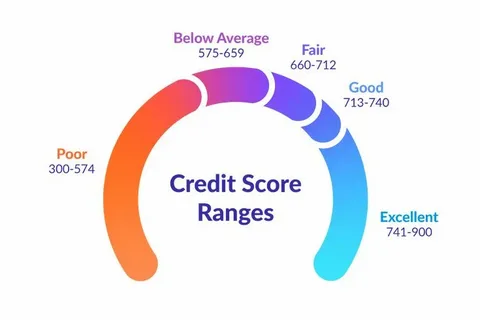What Does a 651 Credit Score Mean?
A 651 credit score falls in the “fair” category on most credit scoring models, such as FICO and VantageScore, which both range from 300 to 850. Here’s how the typical breakdown looks:
- Poor (300-579): Credit scores in this range suggest significant credit risks and often come with difficulty obtaining credit.
- Fair (580-669): A 651 score sits within this “fair” range. Lenders see borrowers in this range as having some risk but still likely to repay debts.
- Good (670-739): People with scores in this range are generally eligible for better loan terms and lower interest rates.
- Very Good (740-799): Borrowers here are seen as low risk and enjoy access to some of the best financial products.
- Excellent (800-850): A near-perfect score comes with the best interest rates and the highest chances of approval for any form of credit.
With a 651 credit score, you’re not far from entering the “good” credit range. But until you cross that threshold, you may face obstacles, such as higher interest rates, less favorable loan terms, and limited access to premium credit cards. Now let’s examine how having a 651 credit score might be holding you back.
How a 651 Credit Score Affects Your Financial Life
While a 651 credit score isn’t the worst, it’s still far from ideal. Lenders, landlords, and even potential employers may evaluate your credit score before making decisions. Here’s how this score can influence different areas of your life:
1. Higher Interest Rates on Loans
Lenders look at credit scores to assess risk. A 651 credit score indicates a moderate level of risk, which means you may be approved for loans like a car loan or mortgage, but you won’t get the best interest rates. For example, a person with excellent credit may receive an interest rate of 3%, while someone with a 651 credit score could be offered a rate closer to 5% or higher. Over time, these higher rates can add thousands of dollars to the cost of a loan.
2. Credit Card Options
With a 651 credit score, you may still be able to get approved for credit cards, but likely not the ones with the most attractive rewards programs, cash-back bonuses, or lowest interest rates. Many credit cards designed for people with “good” or “excellent” credit offer features like 0% introductory APRs or no annual fees—perks that are less available to those with fair credit.
3. Impact on Renting an Apartment
Landlords commonly check applicants’ credit scores to gauge their financial responsibility. A 651 credit score could mean you’re required to pay a higher security deposit or even need a co-signer. Some landlords may be hesitant to rent to someone with a fair credit score, viewing it as a sign of financial instability.
4. Insurance Premiums
Did you know your credit score can affect your insurance premiums? In many states, insurance companies use credit-based insurance scores to set rates for auto and homeowners insurance. A lower credit score, such as a 651, could result in higher premiums. Insurers often assume that people with lower credit scores are more likely to file claims.
5. Approval for Utilities
When you set up utilities for a new home, the service provider may check your credit score. If you have a 651 credit score, you might be asked to pay a deposit upfront, which would not be the case if you had a higher score.
6. Job Opportunities
Some employers (especially in fields like finance) check the credit reports of potential employees. A 651 credit score might not automatically disqualify you, but it could raise concerns about your financial responsibility, especially for jobs that require handling money or sensitive financial information.
Is a 651 Credit Score Holding You Back? Here’s How to Fix It
The good news is that if you’re sitting at a 651 credit score, there are concrete steps you can take to improve it. Raising your score doesn’t have to be a long, drawn-out process, but it does require focus and commitment. Below, we’ll explore several strategies that can help boost your credit score quickly and effectively.
1. Review Your Credit Report for Errors
One of the first things you should do if you’re looking to improve your credit score is to review your credit report for inaccuracies. Errors on your credit report can be dragging down your score without you even knowing it. Common mistakes include:
- Incorrect account balances
- Accounts that don’t belong to you
- Incorrect payment history
You can get a free copy of your credit report once per year from each of the three major credit bureaus (Equifax, Experian, and TransUnion) via AnnualCreditReport.com. If you find any mistakes, file a dispute with the credit bureau to get them corrected.
2. Pay Down Your Balances
Your credit utilization ratio—how much of your available credit you’re using—is one of the biggest factors that affect your credit score. Ideally, you want to keep your credit utilization below 30%, and below 10% is even better.
For example, if you have a total credit limit of $10,000 across all your credit cards, you should try to keep your total balances below $3,000. If your utilization is higher than that, paying down your balances as quickly as possible can give your credit score a fast boost.
3. Negotiate with Creditors
If you have any outstanding debt or past-due accounts, now is the time to address them. Contact your creditors to see if they’re willing to negotiate a payment plan or settle your debt for less than the full amount. Many creditors would rather get a partial payment than nothing at all, so you might be able to strike a deal that helps improve your credit standing.
Additionally, if you’ve been a generally responsible borrower but had one or two late payments, try sending a goodwill letter to your creditor. In this letter, you explain the circumstances that led to the missed payment and request that the late payment be removed from your credit report. While there’s no guarantee this will work, it can be worth a try, especially if your overall payment history is strong.
4. Become an Authorized User on a Good Account
If you have a family member or close friend with a good credit score, ask if they would be willing to add you as an authorized user on one of their credit cards. This strategy can work wonders, especially if the primary cardholder has a long credit history, low credit utilization, and an impeccable payment record.
When you’re added as an authorized user, the primary account holder’s positive history is reported on your credit report, which can improve your score. Just make sure the person you’re asking is financially responsible, as their mistakes could hurt your score as well.
5. Increase Your Credit Limit
If your credit utilization ratio is too high, another strategy is to request a credit limit increase from your credit card issuers. If you have a solid payment history and your income has recently increased, your credit card company may agree to increase your limit, which will automatically lower your utilization ratio.
For example, if you currently have a $5,000 limit and a $2,500 balance, your credit utilization is 50%. But if your limit is increased to $10,000, your utilization drops to 25%, which could give your credit score a boost.
6. Diversify Your Credit Mix
Your credit score also takes into account the different types of credit you have. This is referred to as your “credit mix,” and it includes things like credit cards, mortgages, car loans, and student loans.
If you only have credit cards, adding an installment loan (like a personal loan or auto loan) could improve your score. But keep in mind that simply taking out a loan won’t boost your score on its own. You still need to manage it responsibly by making on-time payments and keeping your balance low.
7. Consolidate Your Debt
If you’re struggling to keep up with multiple credit card payments or high-interest loans, debt consolidation may be a smart move. By consolidating your debt into one loan with a lower interest rate, you can simplify your payments and potentially pay off your debt faster.
Consolidating credit card debt can also help your credit score by lowering your credit utilization. Paying off your credit card balances and moving them to an installment loan could result in a quick boost to your score.
8. Use a Secured Credit Card
If you’re having trouble getting approved for traditional credit cards, a secured credit card can help you build or rebuild your credit. With a secured card, you make a deposit (which acts as your credit limit), and then use the card just like a regular credit card. As you make on-time payments and keep your balance low, your responsible use will be reported to the credit bureaus, helping to improve your score.







